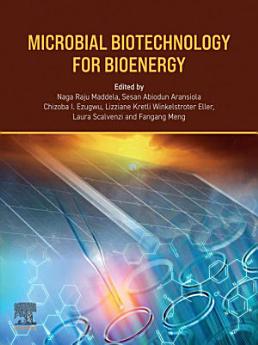Microbial Biotechnology for Bioenergy
Tungkol sa ebook na ito
Tungkol sa may-akda
Dr. Naga Raju Maddela is Professor of Microbiology at the Technical University of Manabi. He obtained his MSc and PhD in Microbiology from Sri Krishnadevaraya University, India, and conducted post-doctoral research at Sun Yat-sen University, China. His area of interest is environmental microbiology with a focus on the ecological impacts of industrial effluents and insecticides. Dr. Maddela is a member of the Microbial Society, England, the International Biodegradation & Bioremediation Society, Great Britain, and the American Society for Microbiology.
Dr. Sesan Abiodun Aransiola is Lecturer at the Department of Microbiology, University of Abuja, Nigeria. He obtained his BTech, MTech, and PhD in Microbiology from the Federal University of Technology, Minna, Nigeria. His area of interest is environmental microbiology with a focus on biosorption and bioremediation. Dr. Aransiola is a member of both the Nigerian Society for Microbiology and the American Society for Microbiology, and has co-edited several books on the topic, including Elsevier’s Microbial Technology for Bioenergy (2024).
Ezugwu Chizoba Ignatius received his PhD in Material Physics and Chemistry in 2016 at Wuhan University of Technology, China. At the State Key Laboratory of Advanced Technology for Material Synthesis and Processing, his research interest was focused on design, preparation and modifications of metal-organic frameworks for catalytic organic transformation. While working with Prof. Verpoort, he developed new N-heterocyclic carbene based MOF catalysts that are very efficient for coupling and condensation reactions. His PhD research was fully sponsored by Chinese Government Scholarships, and he was awarded the «2016 Outstanding International Graduating Student Award» of Wuhan University of Technology. Presently, he is developing advanced hybrid catalytic materials for CO2 reduction as a GET-COFUND MarieCurie Fellow at the University of Alcala and IMDEA Water Institute.
Laura Scalvenzi has a Doctoral Degree in Biotechnology and a bachelor’s degree in Agricultural Sciences. She worked in international development project focused on sustainable use of biodiversity in the Amazonian rainforest (Ecuador), according to the Sustainable Development Goals (SDGs). acted as scientist and facilitator between universities, government, and non-governmental organizations. I possess emotional intelligence and I am very empathic with people. I have strong analytical, problem solving, time management, scientific and teamwork skills.
Fangang Meng is an academic researcher from Sun Yat-sen University. The author has contributed to research in topic(s): Membrane fouling & Membrane bioreactor. The author has an h-index of 39, co-authored 135 publication(s) receiving 7429 citation(s). Previous affiliations of Fangang Meng include Guangzhou Higher Education Mega Center & Hong Kong University of Science and Technology.




